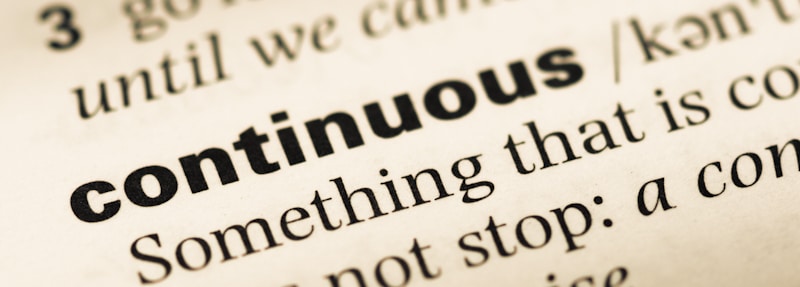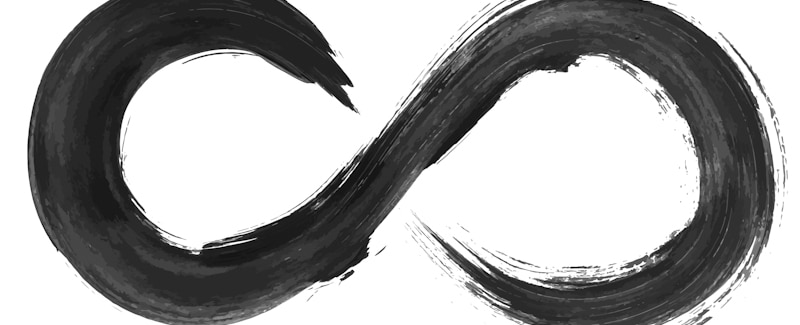Heluva Hostile Exclusivity Longevity Use Continuous Uninterrupted Used
When two terms are derived from the same root word, they could be challenging to differentiate or not get confused between while writing. And when those two words have comparable spellings, things get even trickier. The tale with "continuous" and "continual" is a bit on those lines.
The term "continuous" signifies a thing or process that occurs seamlessly without breaks. "Continual", on the other hand, denotes an activity that happens regularly with pauses/breaks in between. The river flows "continuously" and not "continually". Similarly, lightning is always "continual".
If you're still unclear about the differences between the two terms, keep reading to learn more about their meanings, how to incorporate them in writings, and lots more.

"Continuous" – Definition
The word "continuous" implies "uninterrupted flow". "Continuous" things do not stop for anything. For instance, a "continuous ice sheet" has zero cracks. Also, a "continuous noise" will have no pauses in between.
Kindly note, "continuous" denotes any occurrence or activity without "interruptions". It doesn't necessarily imply "uniformity".
For example, "continuous" traffic noise doesn't mean the noise levels are "uniform" or "constant". The noise levels could go down during non-peak hours and increase during the busy hours of the day. When traffic noise is termed "continuous", it just means the noise is "persisting".
Similar is the case with rainfall. Any rain session will be considered "continuous" if it's non-stop or there are no dry spells in between. Whether the rain is pouring down or is just a drizzle doesn't matter or count.
"Continual" – Definition
The term "continual" means "recurring steadily and in quick succession". In other words, any given thing or process that's considered "continual" will start and stop at frequent or regular intervals.
Terms comparable to or synonymous with "continual" include "ceaseless", "continuing", "incessant", "unceasing", etc. These synonyms, however, do not denote the "recurrence" or "closed prolonged succession" that "continual" implies.
In specific scenarios, "constant" comes quite close to "continual" in meaning, denoting "persistent or uniform occurrence".
Comparing "Continuous" and "Continual"
The terms "continuous" and "continual" overlap quite a bit with their meanings, primarily because both have their roots in the word "continue". The term "continue" itself comes from "continuare", a Latin word, which means "to connect or join together". As a result, the two terms are used interchangeably quite often.
The word "continual" is typically used in contexts where the intended meaning is "repetition with pauses in-between". "Continuous", on the other hand, indicates "a non-stop approach". For example, "continual improvement" indicates a method that incorporates "phases of relentlessness" and "periods of breaks". "Continuous improvement" means "an uninterrupted flow".
"Continuous" and "Continual" – A Brief History
The distinction between the two terms was established during the mid-1850s and has been in practice ever since. However, the contrast tends to overlook that "continual" is the older of the two terms and used to mean what "continual" currently denotes.
"Continual" has been around as a valid English term since the 1400s. "Continuous", on the other hand, made its foray into the language only during the 17th century.
Once the word "continual" came into being, "continuous" relinquished its alternate meaning and kept its current meaning only. That said, "continual" can also be used to connote "continuing without interruption". The usage, however, isn't correct.
Simply put, "continual" is "chronic", and "continuous" is "recurring".
Using "Continuous" and "Continual" in Writings
As mentioned above, "continuous" and "continual" could be interchangeably used in writings, and the error may not be that blatantly apparent, thanks to the similarities in meaning between the two words.
However, it's imperative to delineate the two or not use "continuous" in place of "continual", or vice versa. For example, an illness that lasts for months is "continuous" and not "continual". Similarly, people in a war-struck region live in "continuous" fear.
If an electrical device in your home is buzzing non-stop, and you cannot ascertain which equipment or the source of the sound, call in an electrician and tell them something is "continuously" buzzing.
Certain things could be described as either "continuous" or "continual". A smoke alarm, for instance, goes off "continually" if it's defective. A properly functioning smoke alarm, however, buzzes "continuously" upon detecting smoke in its vicinity.
If it rains for 12 hours straight, the rainfall was "continuous". If it, however, rained throughout the week but only during the day and not in the evenings, the rainfall was "phased" or "continual". There will be some sunny breaks in between "continual" rain. "Continuous" rain typically means no glimpse of the sun at all.

Here are a few more things that are "continuous" and not "continual" in nature:
- A river flows continuously.
- Earth moves or revolves around the sun continuously.
The word "continuous" works in the following sentences:
- Based on the findings, the natives of the land are among the world's most ancient continuous populations.
- The fact that the industry has no continuous, long history makes it easier for the existing players to fudge facts or bend the rules as they wish.
On the other hand, phone calls to an office and train or flight departures are "continual" as they take place regularly but not uninterruptedly.
Here are a few sentences that rightly used "continual" and not "continuous":
- The organization reported continual meetings with the state on the plight of abandoned senior citizens.
- She now clearly understands what her brother had to continually endure just because he was younger than her.
- After continual plot twists, flash-forwards, and flashbacks, fans of the show will finally get to see what ultimately transpires.
Ascertaining whether to use "continually" or "continuously" in a sentence is relatively easy if you know whether the "action" being discussed stops. Certain things do work "continuously", and most things do not. A clock ticks "continuously". The heart beats "continuously," too.
Lightning, however, doesn't strike continuously. The following sentence is incorrect, for example:
- She was too scared to sleep that night as lightning was striking continuously.
If lightning were "continuous", it would turn out to be much more than just "scary". In other words, "continuous" lightning can be extremely detrimental to the planet and its inhabitants. The above sentence should use "continually" in place of "continuously", therefore.
Here are a few more sentences that use "continuous" and "continual" incorrectly:
- The continuous street repair work disrupted traffic in the area for close to a year. (Use "continual")
- He spoke continually for 30 minutes before taking questions. (Use "continuously")
The adverbs "continually" and "continuously" should also be incorporated into texts by adhering to the aforementioned conventions.
Remembering the Difference Between "Continuous" and "Continual"
If remembering the two words' meanings doesn't help much, use this mnemonic trick to not confuse the two or use the right term when the need arises.
The word "continuously" incorporates the letter "u" in quick succession. Associate the alphabet with "unceasingly" and "uninterruptedly" to remember its meaning.
"Continually", on the other hand, is interrupted by a couple of "Ls" that sticks out or separates the letters "a" and "y" in the word. You may, therefore, link the term with "interruption", "break", or "interval".
Example Sentences with the Term "Continuous"
The following is a list of sentences that incorporates the adjective and adverb forms of "continue" well:
- There was continuous chattering in one side of the room.
- The laptop's fans were abuzz continuously.
- The professor lectured continuously for 30 minutes.
- The video was recorded in a single continuous take.
- The brain requires a continuous blood supply.
- Residents reported continuous gun firing.
- From the age of 14 to 65, she was continuously employed.
- The recovery process will be continuous, and it will take at least two months for your arm to function like usual again.
- Is this flight continuous, or will there be stop-offs in between?
- She got into the university after having worked hard continuously for a year.
- The continuous hum, though low in volume, was quite annoying.
- The college has been continuously functioning since its inception.
Example Sentences with the Word "Continual"
Here are sentences employing the term "continual" and its inflections:
- There was continual sunshine during the last two days.
- The nation has continually been in a war state since its fight for independence began.
- Her continual interruptions were annoying.
- The movie was continually torturing.
- The door was continually moving courtesy of the incoming and exiting guests.
- He has been continually active during the last couple of years.
- Employee training materials are updated continually.
- At around 2 am, I heard someone continually banging on the door.
- Continual interruptions before the performance meant a break in the rhythm of the performers.
- My stay in that hotel was nothing but continual torture.
- If your conscience is not clean, you'll be in continual fear.
- She was subjected to sexual harassment continually.
Conclusion
"Continuous" and "continual" are not necessarily homonyms. They do not sound the same when pronounced, and their spellings are also relatively different from each other. However, the meanings of the two terms are quite alike. This is probably why the two words get "continually" interchanged in writings, and most people do not bat an eye.
The goal of this article was to drive home the point that – despite being similar to each other in different ways and sharing their etymologies – "continuous" and "continual" are not necessarily synonyms, or they cannot/shouldn't be used as substitutes.
![]()
Shawn Manaher is the founder and CEO of The Content Authority. He's one part content manager, one part writing ninja organizer, and two parts leader of top content creators. You don't even want to know what he calls pancakes.
Source: https://gauthierstrater.blogspot.com/2022/10/heluva-hostileexclusivity-longevity-use.html

0 Response to "Heluva Hostile Exclusivity Longevity Use Continuous Uninterrupted Used"
Post a Comment